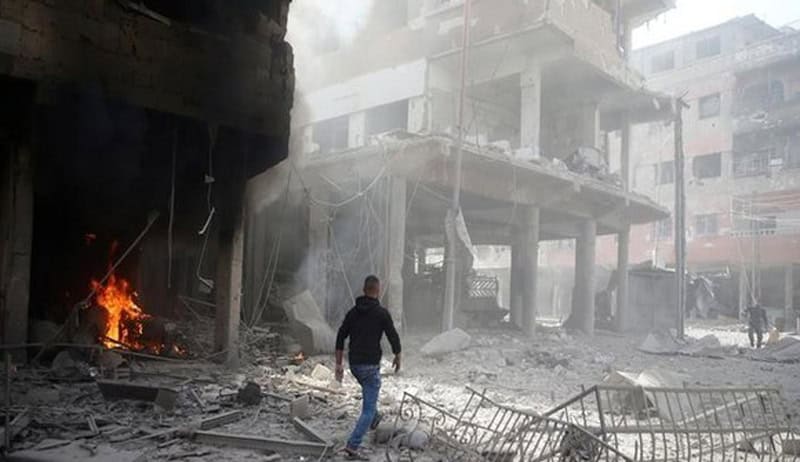Syria: Kurdish-led forces supported by coalition air strikes readied for more evacuations of civilians held as human shields Monday after smashing their way into the jihadists’ last bastion in eastern Syria.
The Syrian Democratic Forces and its allies from the US-led coalition unleashed a deluge of fire on the village of Baghouz at the weekend to break the defences of Islamic State group fighters defending the last dreg of their “caliphate”.
The push on IS’s last pocket of territory had resumed after days of mass evacuations last week but the SDF said Monday that the operation was being hampered by the presence of more civilians in the besieged enclave.
“We’re slowing down the offensive in Baghouz due to a small number of civilians held as human shields by Daesh,” spokesman Mustefa Bali said, using an Arabic acronym for IS.
“In order not to harm them, we are advancing slowly but we assert that the battle of Baghouz will end in a short period of time,” he said.
The frontline appeared calm on Monday, even as war planes zipped over the village of Baghouz.
A field commander said the operation had slowed down since Sunday, when IS family members exited the pocket.
“More are expected to come out today,” he said, though adding there was no clear number.
Despite being hugely outnumbered and outgunned, the diehard jihadists making a desperate last stand in the riverside hamlet — most of them foreigners according to the SDF — are putting up stiff resistance.
– Air strikes –
The unknown number of jihadist fighters defending the very last piece of territory remaining of the “caliphate” that Abu Bakr al-Baghdadi proclaimed in 2014 are using a vast network of tunnels to carry out attacks.
SDF officers perched on rooftops received information from elite units to localise IS positions and passed them on to the coalition to call in air strikes.
IS has lost several of its positions in such strikes since the fighting resumed on Friday night, sending huge clouds of black smoke over Baghouz, a village nestled in a palm-lined bend of the Euphrates River.
“Well played! That was a jihadist sniper position,” Kurdish commander Hagit Qamishlo relayed into a walkie talkie as he stood on a terrace with AFP reporters about 800 metres (yards) from the impact point.
The capture of Baghouz would mark the end of IS territorial control in the region and deal a death blow to the “caliphate”, which once covered huge swathes of Syria and Iraq.
At its peak more than four years ago, the proto-state created by IS was the size of the United Kingdom and administered millions of people, including two million in Iraq’s second city of Mosul alone.
It minted its own currency, levied taxes, published a wide array of propaganda material and designed its own school curricula.
The caliphate effectively collapsed in 2017 when IS lost most of its major cities in both countries.
– More civilians –
The loss of Baghouz, which the SDF says is only days away, would carry mostly symbolic value.
The latest military operation has nonetheless sparked a major humanitarian emergency, with thousands of people of various nationalities emerging from the ruins of the “caliphate” and washing up in Kurdish-run camps.
The SDF, which launched a broad operation against the jihadists’ last bastions in the Euphrates Valley in September, said Friday they had evacuated the last batch of civilians.
However, the families of several French jihadists contacted in France by AFP said Sunday that women and children remained in the enclave.
An AFP reporter in Al-Omar oil field, one of the main staging areas for the assault on Baghouz, said empty trucks were heading to the front line, most likely to ferry out more rescued civilians.
After months under heavy bombardment and sometimes with very little to eat, families emerging from Baghouz are often in poor physical and psychological health.
The foreigners among them are not wanted in their countries of origin and locals are filling camps that the Kurdish administration in the region says it needs more international help to run.
[source_without_link]AFP[/source_without_link]

